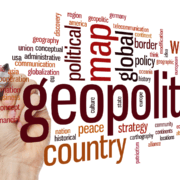Geopolitics with Purpose: EY-Parthenon Drives Strategy, Not Just Awareness
In early July, TBR met with Oliver Jones and Antony Jones, both part of EY-Parthenon. Oliver Jones runs the firm’s Geopolitical Risk Advisory practice, and Antony Jones manages the Parthenon brand. The following reflects that discussion and TBR’s ongoing analysis of EY, the rest of the Big Four, and the management consulting space.
EY-Parthenon turns geopolitical risk into strategic growth opportunities
TBR has long maintained that the Big Four firms have an inherent advantage against all competitors when it comes to understanding and advising on geopolitical risk. Perhaps only the U.S. government has the same global spread of talent, with professionals in nearly every country, most intimately aware of local business, economic and even political trends. When EY-Parthenon showed off its Geopolitical Advisory team recently, TBR wanted to know: Is this something special?
According to EY, there are several factors that make its Geopolitical Advisory practice special, or at least different than its peers’ similar practices. First, the firm backs its current assessments with eight-plus years of geopolitical research, giving the firm’s analysis additional perspective and depth. Second, according to Oliver Jones, EY-Parthenon’s Global Geostrategic Business Group leader, EY’s counsel addresses issues at a highly granular level — industry, geography, technology, location and business model — rather than maintaining just a broad view. Third, Jones said EY-Parthenon helps its clients to answer the question, “Well, what should we do about it?”
The firm does not stay stuck in “interesting conversation mode,” examining the nuances of tricky geopolitical situations and trends, but instead takes on clients’ challenges and provides advice informed by EY’s research. In Jones’ phrase, “geopolitics in practice,” he added one more nuance that perhaps separates EY from peers in this area: The geopolitical advisory team emerged from and belongs to EY-Parthenon — the firm’s transformative strategy and transactions arm — and not from the Risk practice, as is the case at most peers. This evolution, according to Jones, gives EY’s team “investment DNA” and not “risk DNA,” so the team’s value proposition is not only risk mitigation but also growth strategies.
Putting geopolitics at the heart of a growth strategy
Oliver Jones acknowledged that knowledge management at EY can be as challenging as it is everywhere else and said his team focuses on getting all the money-making engines within the firm thinking about geopolitical risk, a task made slightly easier by the constant barrage of geopolitical news, including kinetic wars and trade wars. He said EY-Parthenon’s research shows geopolitical risks and artificial intelligence have risen to the top of boards of directors’ concerns. Of the two, geopolitical risk is more immediate and visceral while also underpinning some of the AI-related concerns around data center locations and hyperscaler dominance.
He also explained that chief risk officers have not been his practice’s main focus — back to the advisory DNA — but instead his team works alongside other EY-Parthenon professionals as they engage with board chairs, board members, CEOs and chief strategy and/or chief sustainability officers. As Antony Jones, EY-Parthenon Brand, Marketing and Communications leader, noted, EY’s brand centers on strategic issues, and EY-Parthenon — and EY broadly — has access to boards, senior private equity and government clients, providing a natural entrée for brand centers on strategic issues. The firm routinely has access to board chairs, providing a natural entrée for geopolitical advisory. As for the commercial models, Oliver Jones explained that the firm offers both monthly retainer services, a kind of managed services offering with dashboards and indicators, as well as bespoke engagements, typically focused on a specific problem set or location.
Is EY really different? Way back in 2017, we wrote about PwC’s Growth Markets Centre and how that firm provided “analysis for clients and partners, supplemented by PwC professionals with direct experience in previous engagements. The firm assists clients with regional-, country- and city-level market analysis and, when possible, information from and the views of PwC partners who have worked in the selected cities with clients in the same or similar industries.” The partner who led that effort came from the firm’s strategy organization and now resides within PwC’s International Growth Practice. Deloitte and KPMG appear to house geopolitical risk either across multiple practices (Deloitte) or within Risk (KPMG), separating, at least on paper if not in practice, those firms’ strategy consulting “arms” from their geopolitical risk “fingers.”
Organizational structure, DNA and even knowledge management can only differentiate a firm so much, and none of those issues and decisions matter to clients looking for advice. For EY and peers, the challenge remains permission: Do clients want to pay you for your insights on trade wars, shooting wars, supply chains, elections, regulations and geopolitical risks? Framing a discussion around what is happening in the world, what those developments mean in a client’s industry and geography, and then moving to what the client should do about it attacks that permission question directly. More than smart thinking, EY’s focus starts with clients’ paths to growth.
Other firms will say they are doing the same thing, just in a slightly different way, and TBR does not doubt that. What could separate a firm is the willingness and ability to tap into that global talent pool we mentioned at the start of this post. You have a global client headquartered in Frankfurt, Germany, that wants to know how French politics might dampen economic growth? Maybe ask the 33,000 professionals you have living in Paris and beyond what they think. When the CIA wants to know what is happening, the first place it turns to is the people with boots on the ground.

 Getty Images
Getty Images
